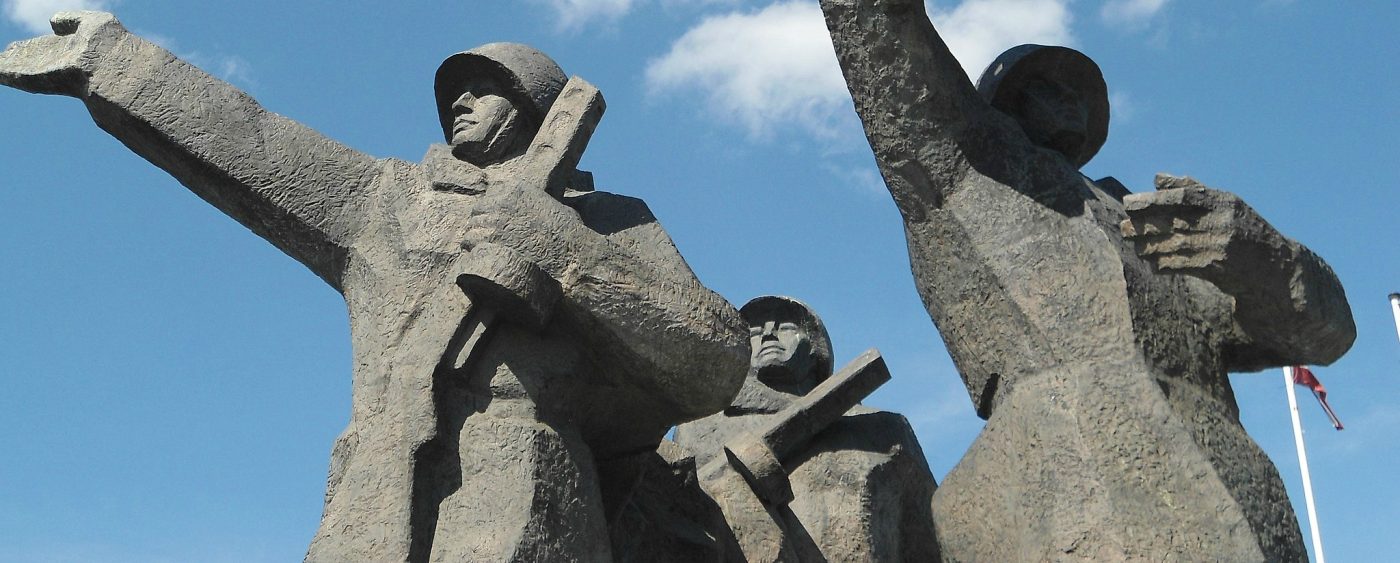The Russian media reported on June 13 that the Saeima (Parliament of Latvia) decided to demolish the Victory Monument in Riga, which honors the Soviet Army’s victory over Nazi Germany in World War II. The news was false, but gained significant resonance within Latvia’s Russian speaking community and Kremlin-friendly media. Popular differences of opinion over Latvian history, as well as the significance of the memorial and its future have long been intense. The latest incident shows how Moscow uses controversy to stoke the anger of Latvia’s Russian-speaking community.
As reported by the Baltic Center for Investigative Journalism Re:Baltica, the Russian media outlet BB (formerly known as Vesti) said on June 13, 2019 that the Saeima had voted in favor of the demolition of the Victory Monument, even though no such vote occurred. The news was picked up by pro-Kremlin activist Alexander Gaponenko, who commented on his Facebook profile: “The Saeima has decided to demolish the Russian sanctuary by awarding the victory of the Great Patriotic War [against] European national socialism.” The post was shared by several hundred people and raised anger within the Russian-speaking community. When Re:Baltica reached out to Gaponenko about his sharing of false news, he replied: “I was convinced that the Saeima voted for demolition.” He has been arrested before by the State Security Service (VDD) for hate speech and spreading disinformation.
In fact, on June 13, the Latvian parliament voted on reviewing a document which calls for the demolition of the Victory Monument. It had been submitted by Latvian citizen Uģis Polis through manabalss.lv, a platform dedicated to public initiatives. It was signed by over 10,000 citizens, the requirement for submission to Parliament, and then given to Saeima’s committees for further consideration. That is when the BB news story appeared with the title, “The Saeima voted for the demolition of the Victory Monument.” BB is known for using one of the Kremlin’s most common techniques of spreading disinformation: a misleading title. The title was later changed but only after other media and activists had already spread the false news.
Similar initiatives regarding the Victory Monument have been submitted to the Saeima before, but the parliament has refused to consider them. As reported by Re:Baltica, the Ministry of Foreign Affairs has repeatedly stated that the monument is protected by an agreement signed in 1994 with Russia on the social protection of Russian military personnel and their families residing in Latvia. The law states: “In accordance with international practice, the Latvian Part shall ensure the cleaning, improvement, and preservation of memorial buildings and soldiers’ mass burial sites in the territory of the Republic of Latvia.”
The fake news story was also carried in other Russian media outlets. On June 17, the news site RuBaltic.ru published an opinion piece titled “Provocations with monuments will bring Latvia to blood.” The article recalled “precedents from the recent past, when populist decisions about the demolition of monuments caused mass protests and even led to blood and victims.” An opinion article was published on the same site later that day titled “Gasparyan urged Russia to take tough measures in defense of the Monument to the Soldier-Liberators of Riga.” The article reported that Armen Gasparyan, the pro-Kremlin historian, urged Russian intervention to stop the apparent demolition.
The Kremlin-friendly media outlet Riafan.ru also carried the story. There, activist Alexey Sharipov who is a regular commentator on controversial Russian media channels, argued that the Latvian government’s “decision” on the Victory monument and others in the past prove that Nazi sympathizers are still in power. He blamed the Latvian government for “political repressions,” “approval of the initiative to demolish the Monument to the Liberators,” and the ban on wearing Soviet uniforms. These typical Russian media perspectives have a simple goal: raise anger and fear, and call Russian-speaking people to action against the Latvian state.
The story about the monument resonated throughout the Russian community because that group regards the monument as a symbol of the Soviet Union’s strength and the symbol of its victory in World War II. Every year on May 9, hundreds of ethnic Russians gather around the Victory Monument for a celebration. Since 2011, the “Immortal Regiment” procession has been held on that day, an event which commemorates the Red Army soldiers who fought in World War II. As reported by the VDD, “realizing the large numbers of people mobilized by the event, the Russian government began funding it and using it as an instrument to consolidate the nation of Russia and compatriots abroad using the so-called ‘victory ideology.’” The Kremlin characterizes opposition to Soviet military memorial activities as a “rebirth of fascism.”
There are three main narratives that Russia is pursuing towards Latvia: that it systematically discriminates against its ethnic Russians; that fascism is on the rise; and that Latvia is a failed state. Citizens of Latvia who hold pro-Kremlin views, or are easily convinced of Russia’s pursued narratives and geopolitical goals, threaten Latvia’s national security. According to VDD, “Russia’s propaganda outlets continue to use and improve their existing informational influence instruments to ensure the presence in Latvia’s society of information favorable to Russia’s foreign policy interests.”
CEPA StratCom is an online journal covering crucial topics in strategic communications in the transatlantic community. All opinions are those of the author and do not necessarily represent the position or views of the institutions they represent or the Center for European Policy Analysis.
Europe’s Edge is CEPA’s online journal covering critical topics on the foreign policy docket across Europe and North America. All opinions are those of the author and do not necessarily represent the position or views of the institutions they represent or the Center for European Policy Analysis.





